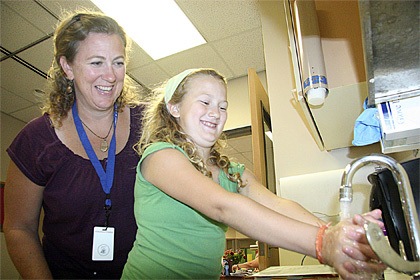Noticing an unusual number of children heading to the health room with fevers, coughs and sore throats, Snoqualmie Valley School District nurses are asking families to be proactive in protecting themselves from H1N1 influenza, better known as the swine flu.
“It seems early to be this busy,” said Carol Gunning, school nurse at Opstad Elementary and Twin Falls Middle School in North Bend. Flu season typically begins in November, but school district officials are taking no chances in preparing for a bout with H1N1.
There have been no reported cases of H1N1 flu in the district, which geared up last May for potential cases.
However, more than 700 schools nationwide, several in Seattle, closed this year because of the disease.
“It’s never gone away,” district spokeswoman Carolyn Malcolm said.
However, the Centers for Disease Control have changed their recommendations on how school districts deal with the disease, because symptoms of H1N1 flu have been found to be milder than expected.
Last year, schools were told to close for five days if a case was found. Now, schools may stay open.
Schools are following the same guidelines as a typical flu — if students have flu symptoms, they should stay home until they are free of symptoms.
“Now, they’re putting it on families and schools to use personal prevention, common sense and hygiene,” Malcolm said. “Stay home if you are sick.”
To keep from getting the flu, children should get good nutrition, plenty of sleep and wash their hands often.
If a child or adult coughs or sneezes, they should cover their mouth and nose with a tissue. Families are also advised to get vaccinated for both seasonal flu and H1N1 flu when those vaccines become available later this fall.
Take it serious
Families should take H1N1 seriously enough to do what they need to do to prevent themselves from getting it, Gunning said.
“They need to do what we tell people every year — wash your hands, take care of yourself when you are sick and protect the people around you,” she added.
Two people have died from H1N1 flu in King County. One was an elderly man, the other a young girl. In August, two people were found with strains of H1N1 flu resistant to the drug Tamiflu.
Populations with high risk to the strain include young children, those who care for children younger than age 5, pregnant women, and people with compromised immune systems or underlying medical conditions.
• Learn more about protecting yourself from H1N1 flu at the school district Web site, www.svsd410.org and the Seattle/King County Public Health site, www.kingcounty.gov/health/swineflu.
• See related story on H1N1 flu on page 7



